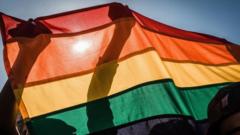The World Bank announced that it is rescinding a two-year ban on loans to Uganda, which was imposed after the nation enacted one of the world's strictest laws against LGBTQ individuals. This legislation, passed in 2023, allows for the death penalty for certain same-sex acts and has resulted in widespread violence, evictions, and arrests targeting the LGBTQ community, according to human rights organizations.
Despite these concerns, the World Bank asserts that it has adopted new "mitigation measures" to ensure that funding does not discriminate against LGBTQ individuals and allows for broader participation in development projects. A spokesperson emphasized that the organization cannot combat poverty effectively unless all individuals can benefit from financed projects.
The financial institution plays a crucial role in Uganda's development, supporting initiatives aimed at infrastructure, education, and social protection. However, some critics express concerns over the funding model of the World Bank and the International Monetary Fund, stating it fosters dependence and hinders growth in underprivileged nations.
Following the implementation of the Anti-Homosexuality Act, Uganda faced significant international backlash, costing the country an estimated $470 million to $1.7 billion in lost funding. While the Ugandan government claims the law mirrors the conservative beliefs of its populace, critics argue it distracts from pressing issues like unemployment and political oppression. Instances of attacks against LGBTQ individuals have increased since the law's enactment.




















